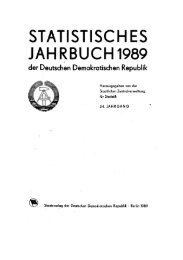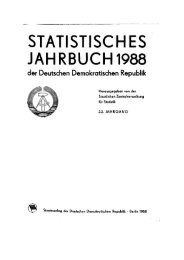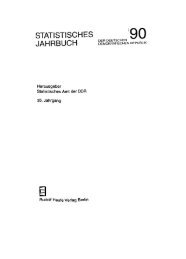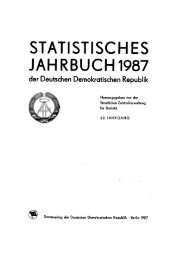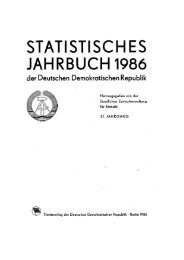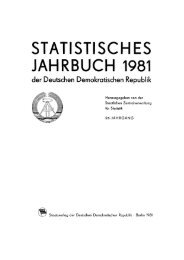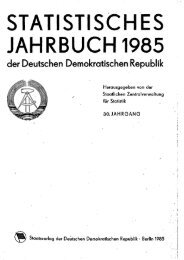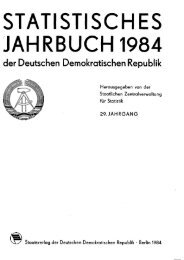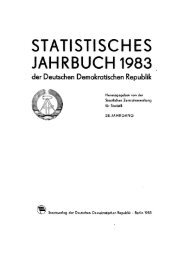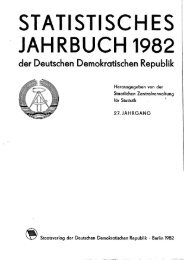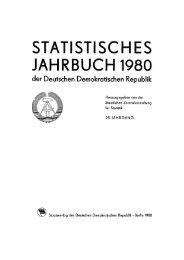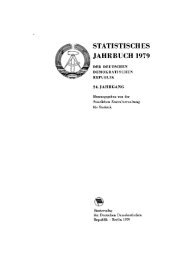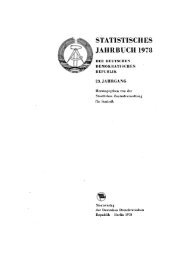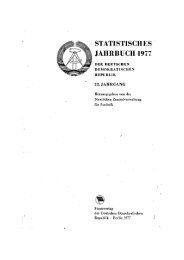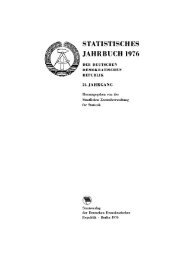- Page 2 and 3: ERRATA / Erratum Anuário Estatíst
- Page 4 and 5: ERRATA - Anuário Estatístico de P
- Page 6 and 7: ficha técnica Título Anuário Est
- Page 8 and 9: The Statistical Yearbook of Portuga
- Page 11 and 12: The Statistical Yearbook of Portuga
- Page 13 and 14: O INSTITUTO NACIONAL DE ESTATÍSTIC
- Page 15 and 16: Todos os Pontos de Acesso dispõem
- Page 17 and 18: Sinais convencionais Glossário Glo
- Page 19 and 20: Siglas e abreviaturas Acronyms and
- Page 21 and 22: THE TERRITORY 18 | Statistical Year
- Page 23: THE TERRITORY O Arquipélago da Mad
- Page 27 and 28: THE TERRITORY Estabelece, ainda, o
- Page 29 and 30: THE TERRITORY Planos regionais de o
- Page 31 and 32: THE TERRITORY As diferenças mais s
- Page 33 and 34: THE TERRITORY Os planos de ordename
- Page 35 and 36: THE TERRITORY Ao longo deste perío
- Page 37 and 38: THE TERRITORY As dinâmicas territo
- Page 39 and 40: THE TERRITORY No primeiro caso, ver
- Page 41 and 42: THE TERRITORY A comparação entre
- Page 43 and 44: THE TERRITORY Verifica-se, no entan
- Page 45 and 46: THE TERRITORY Na Região Autónoma
- Page 47 and 48: THE TERRITORY Designadamente, nos
- Page 49 and 50: THE TERRITORY Naturalmente, a conce
- Page 51 and 52: THE TERRITORY Em 2004, a pressão u
- Page 53 and 54: THE TERRITORY Ao nível das NUTS II
- Page 55 and 56: THE TERRITORY Em conjunto com o Dec
- Page 57 and 58: THE TERRITORY ainda que o caudal de
- Page 59 and 60: THE TERRITORY As receitas e despesa
- Page 61 and 62: Websites www.ine.pt www.europa.eu.i
- Page 63 and 64: Ficha técnica | Technical support
- Page 65 and 66: THE TERRITORY | Territory I.1.2 -
- Page 67 and 68: THE TERRITORY | Territory I.1.4 - P
- Page 69 and 70: THE TERRITORY | Territory I.1.6 - P
- Page 71 and 72: THE TERRITORY | Territory I.1.8 - L
- Page 73 and 74: THE TERRITORY | Territory I.1.11 -
- Page 75 and 76:
Websites www.ine.pt www.europa.eu.i
- Page 77 and 78:
Ficha técnica | Technical support
- Page 79 and 80:
THE TERRITORY | Environment I.2.1 -
- Page 81 and 82:
THE TERRITORY | Environment I.2.5 -
- Page 83 and 84:
THE TERRITORY | Environment I.2.9 -
- Page 85 and 86:
THE TERRITORY | Environment I.2.12
- Page 87 and 88:
THE TERRITORY | Environment I.2.13
- Page 90 and 91:
II. 1. Family structures and educat
- Page 92 and 93:
AS PESSOAS regional permite conclui
- Page 94 and 95:
AS PESSOAS Em geral, a evolução d
- Page 96 and 97:
AS PESSOAS Neste contexto, será im
- Page 98 and 99:
AS PESSOAS período de seis anos en
- Page 100 and 101:
AS PESSOAS que o tamanho do grupo d
- Page 102 and 103:
AS PESSOAS do valor médio das pens
- Page 104 and 105:
AS PESSOAS O gráfico 11 indica um
- Page 106 and 107:
AS PESSOAS 3. Estado Providência
- Page 108 and 109:
AS PESSOAS A conjugação da diminu
- Page 110 and 111:
AS PESSOAS Esta mudança das caract
- Page 112 and 113:
AS PESSOAS 4. Terciarização Um do
- Page 114 and 115:
AS PESSOAS A combinação entre con
- Page 116 and 117:
AS PESSOAS Portugal continua a ser
- Page 118 and 119:
AS PESSOAS Há diferenças de géne
- Page 120 and 121:
AS PESSOAS Verificam-se também var
- Page 122 and 123:
AS PESSOAS Esta informação sobre
- Page 124 and 125:
AS PESSOAS Em termos de decomposiç
- Page 126 and 127:
AS PESSOAS 5. Qualidade de vida A q
- Page 128 and 129:
AS PESSOAS Um outro tipo de estatí
- Page 130 and 131:
AS PESSOAS Os portugueses também t
- Page 132 and 133:
AS PESSOAS Um último aspecto a ter
- Page 134 and 135:
II 1 Designação Taxa de crescimen
- Page 136 and 137:
AS PESSOAS | População II.1.1 - I
- Page 138 and 139:
AS PESSOAS | População II.1.2 - P
- Page 140 and 141:
AS PESSOAS | População II.1.3 - M
- Page 142 and 143:
AS PESSOAS | População II.1.4 - P
- Page 144 and 145:
AS PESSOAS | População II.1.7 - E
- Page 146 and 147:
Classificações usadas nos quadros
- Page 148 and 149:
AS PESSOAS | Educação II.2.1 - In
- Page 150 and 151:
AS PESSOAS | Educação II.2.3 - Al
- Page 152 and 153:
AS PESSOAS | Educação II.2.5 - Al
- Page 154 and 155:
AS PESSOAS | Educação II.2.7 - Pe
- Page 156 and 157:
II 3 Ficha técnica | Technical sup
- Page 158 and 159:
AS PESSOAS | Cultura e Desporto II.
- Page 160 and 161:
AS PESSOAS | Cultura e Desporto II.
- Page 162 and 163:
AS PESSOAS | Cultura e Desporto II.
- Page 164 and 165:
AS PESSOAS | Cultura e Desporto II.
- Page 166 and 167:
AS PESSOAS | Cultura e Desporto II.
- Page 168 and 169:
II 4 Classificações usadas nos qu
- Page 170 and 171:
AS PESSOAS | Saúde II.4.1 - Indica
- Page 172 and 173:
AS PESSOAS | Saúde II.4.4 - Centro
- Page 174 and 175:
AS PESSOAS | Saúde II.4.6 - Farmá
- Page 176 and 177:
AS PESSOAS | Saúde II.4.9 - Mortal
- Page 178 and 179:
AS PESSOAS | Saúde II.4.12 - Casos
- Page 180 and 181:
Classificações usadas nos quadros
- Page 182 and 183:
AS PESSOAS | Trabalho II.5.1 - Indi
- Page 184 and 185:
AS PESSOAS | Trabalho II.5.3 - Popu
- Page 186 and 187:
AS PESSOAS | Trabalho II.5.7 - Popu
- Page 188 and 189:
AS PESSOAS | Trabalho II.5.10 - Pop
- Page 190 and 191:
AS PESSOAS | Trabalho II.5.13 - Pop
- Page 192 and 193:
AS PESSOAS | Trabalho II.5.17 - Var
- Page 194 and 195:
AS PESSOAS | Trabalho II.5.21 - Gan
- Page 196 and 197:
AS PESSOAS | Trabalho II.5.26 - Gre
- Page 198 and 199:
II 6 II 6 Classificações usadas n
- Page 200 and 201:
AS PESSOAS | Protecção Social II.
- Page 202 and 203:
II.6.4 - Beneficiários de subsídi
- Page 204 and 205:
AS PESSOAS | Protecção Social II.
- Page 206 and 207:
AS PESSOAS | Protecção Social II.
- Page 208:
AS PESSOAS | Protecção social II.
- Page 211 and 212:
THE ECONOMIC ACTIVITY Sinteticament
- Page 213 and 214:
THE ECONOMIC ACTIVITY Uma década a
- Page 215 and 216:
THE ECONOMIC ACTIVITY As comparaç
- Page 217 and 218:
THE ECONOMIC ACTIVITY O gráfico 7
- Page 219 and 220:
THE ECONOMIC ACTIVITY É patente qu
- Page 221 and 222:
THE ECONOMIC ACTIVITY III.9 PIB por
- Page 223 and 224:
THE ECONOMIC ACTIVITY Para aferir o
- Page 225 and 226:
THE ECONOMIC ACTIVITY O preço da e
- Page 227 and 228:
THE ECONOMIC ACTIVITY Em Portugal,
- Page 229 and 230:
THE ECONOMIC ACTIVITY A margem brut
- Page 231 and 232:
THE ECONOMIC ACTIVITY A pesca é um
- Page 233 and 234:
THE ECONOMIC ACTIVITY aparece quand
- Page 235 and 236:
THE ECONOMIC ACTIVITY A situação
- Page 237 and 238:
THE ECONOMIC ACTIVITY O turismo é
- Page 239 and 240:
THE ECONOMIC ACTIVITY 4. Preparar o
- Page 241 and 242:
THE ECONOMIC ACTIVITY Em termos ind
- Page 243 and 244:
THE ECONOMIC ACTIVITY Um factor det
- Page 245 and 246:
THE ECONOMIC ACTIVITY operar no ens
- Page 247 and 248:
Websites www.ine.pt www.europa.eu.i
- Page 249 and 250:
Ficha técnica | Technical support
- Page 251 and 252:
THE ECONOMIC ACTIVITY | National Ac
- Page 253 and 254:
THE ECONOMIC ACTIVITY | National Ac
- Page 255 and 256:
THE ECONOMIC ACTIVITY | National Ac
- Page 257 and 258:
THE ECONOMIC ACTIVITY | National Ac
- Page 259 and 260:
THE ECONOMIC ACTIVITY | National Ac
- Page 261 and 262:
Websites www.ine.pt www.europa.eu.i
- Page 263 and 264:
Ficha técnica | Technical support
- Page 265 and 266:
THE ECONOMIC ACTIVITY | Prices III.
- Page 267 and 268:
THE ECONOMIC ACTIVITY | Prices III.
- Page 269 and 270:
Websites www.ine.pt www.europa.eu.i
- Page 271 and 272:
Indicadores Indicators Ficha técni
- Page 273 and 274:
THE ECONOMIC ACTIVITY | Enterprises
- Page 275 and 276:
THE ECONOMIC ACTIVITY | Enterprises
- Page 277 and 278:
THE ECONOMIC ACTIVITY | Enterprises
- Page 279 and 280:
THE ECONOMIC ACTIVITY | Enterprises
- Page 281 and 282:
THE ECONOMIC ACTIVITY | Enterprises
- Page 283 and 284:
THE ECONOMIC ACTIVITY | Enterprises
- Page 285 and 286:
Websites www.ine.pt www.europa.eu.i
- Page 287 and 288:
Classificações usadas nos quadros
- Page 289 and 290:
THE ECONOMIC ACTIVITY | Internation
- Page 291 and 292:
THE ECONOMIC ACTIVITY | Internation
- Page 293 and 294:
THE ECONOMIC ACTIVITY | Internation
- Page 295 and 296:
THE ECONOMIC ACTIVITY | Internation
- Page 297 and 298:
Websites www.ine.pt www.europa.eu.i
- Page 299 and 300:
Ficha técnica | Technical support
- Page 301 and 302:
THE ECONOMIC ACTIVITY | Agriculture
- Page 303 and 304:
THE ECONOMIC ACTIVITY | Agriculture
- Page 305 and 306:
THE ECONOMIC ACTIVITY | Agriculture
- Page 307 and 308:
THE ECONOMIC ACTIVITY | Agriculture
- Page 309 and 310:
THE ECONOMIC ACTIVITY | Agriculture
- Page 311 and 312:
THE ECONOMIC ACTIVITY | Agriculture
- Page 313 and 314:
THE ECONOMIC ACTIVITY | Agriculture
- Page 315 and 316:
Websites www.ine.pt www.europa.eu.i
- Page 317 and 318:
Ficha técnica | Technical support
- Page 319 and 320:
THE ECONOMIC ACTIVITY | Fishery III
- Page 321:
THE ECONOMIC ACTIVITY | Fishery III
- Page 324 and 325:
III 7 Ficha técnica | Technical su
- Page 326 and 327:
A ACTIVIDADE ECONÓMICA | Indústri
- Page 328 and 329:
A ACTIVIDADE ECONÓMICA | Indústri
- Page 330 and 331:
A ACTIVIDADE ECONÓMICA | Indústri
- Page 332 and 333:
III 8 Ficha técnica | Technical su
- Page 334 and 335:
A ACTIVIDADE ECONÓMICA | Construç
- Page 336 and 337:
A ACTIVIDADE ECONÓMICA | Construç
- Page 338 and 339:
A ACTIVIDADE ECONÓMICA | Construç
- Page 340 and 341:
A ACTIVIDADE ECONÓMICA | Construç
- Page 342 and 343:
A ACTIVIDADE ECONÓMICA | Construç
- Page 344 and 345:
III 9 Ficha técnica | Technical su
- Page 346 and 347:
A ACTIVIDADE ECONÓMICA | Transport
- Page 348 and 349:
A ACTIVIDADE ECONÓMICA | Transport
- Page 350 and 351:
A ACTIVIDADE ECONÓMICA | Transport
- Page 352 and 353:
A ACTIVIDADE ECONÓMICA | Transport
- Page 354 and 355:
A ACTIVIDADE ECONÓMICA | Transport
- Page 356 and 357:
III.9.9 -Comércio internacional de
- Page 358 and 359:
III 10 Ficha técnica | Technical s
- Page 360 and 361:
A ACTIVIDADE ECONÓMICA | Comunica
- Page 362 and 363:
A ACTIVIDADE ECONÓMICA | Comunica
- Page 364 and 365:
A ACTIVIDADE ECONÓMICA | Comunica
- Page 366 and 367:
III 11 Ficha técnica | Technical s
- Page 368 and 369:
A ACTIVIDADE ECONÓMICA | Turismo I
- Page 370 and 371:
III.11.2 - Estabelecimentos e capac
- Page 372 and 373:
A ACTIVIDADE ECONÓMICA | Turismo I
- Page 374 and 375:
A ACTIVIDADE ECONÓMICA | Turismo I
- Page 376 and 377:
III 12 Ficha técnica | Technical s
- Page 378 and 379:
A ACTIVIDADE ECONÓMICA | Sector Mo
- Page 380 and 381:
A ACTIVIDADE ECONÓMICA | Sector Mo
- Page 382 and 383:
A ACTIVIDADE ECONÓMICA | Sector Mo
- Page 384 and 385:
III 13 Ficha técnica | Technical s
- Page 386 and 387:
A ACTIVIDADE ECONÓMICA | Ciência
- Page 388 and 389:
A ACTIVIDADE ECONÓMICA | Ciência
- Page 390 and 391:
III 14 Ficha técnica | Technical s
- Page 392 and 393:
A ACTIVIDADE ECONÓMICA | Sociedade
- Page 394:
THE ECONOMIC ACTIVITY | Information
- Page 397 and 398:
THE STATE A composição da conta d
- Page 399 and 400:
THE STATE A conta da Segurança Soc
- Page 401 and 402:
THE STATE Tomando dois grupos como
- Page 403 and 404:
THE STATE Suécia (3,7%), a Espanha
- Page 405 and 406:
THE STATE 2. A Justiça A organiza
- Page 407 and 408:
THE STATE Os primeiros exercem a su
- Page 409 and 410:
THE STATE O Procurador-Geral da Rep
- Page 411 and 412:
THE STATE A composição da activid
- Page 413 and 414:
THE STATE 3. Estrutura Política Po
- Page 415 and 416:
THE STATE Eleições para a Presid
- Page 417 and 418:
THE STATE Os partidos com represent
- Page 419 and 420:
THE STATE Preside aos trabalhos da
- Page 421 and 422:
THE STATE Nas eleições de 1997, o
- Page 423 and 424:
Websites www.ine.pt www.europa.eu.i
- Page 425 and 426:
Ficha técnica | Techical support I
- Page 427 and 428:
THE STATE | Public Administration I
- Page 429 and 430:
THE STATE | Public Administration I
- Page 431 and 432:
THE STATE | Public Administration I
- Page 433 and 434:
Websites www.ine.pt www.europa.eu.i
- Page 435 and 436:
Ficha técnica | Techical support I
- Page 437 and 438:
THE STATE | Justice IV.2.2 - Tribun
- Page 439 and 440:
THE STATE | Justice IV.2.6 - Arguid
- Page 441 and 442:
Websites www.ine.pt www.europa.eu.i
- Page 443 and 444:
Ficha técnica | Techical support I
- Page 445 and 446:
THE STATE | Political Participation
- Page 447 and 448:
THE STATE | Political Participation



